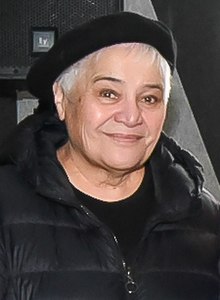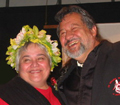The New Zealand foreshore and seabed controversy is a debate in the politics of New Zealand. It concerns the ownership of the country's foreshore and seabed, with many Māori groups claiming that Māori have a rightful claim to title. These claims are based around historical possession and the Treaty of Waitangi. On 18 November 2004, the New Zealand Parliament passed a law which deems the title to be held by the Crown. This law, the Foreshore and Seabed Act 2004, was enacted on 24 November 2004. Some sections of the act came into force on 17 January 2005. It was repealed and replaced by the Marine and Coastal Area Act 2011.

The Te Tai Hauauru by-election was a by-election in the New Zealand electorate of Te Tai Hauāuru, one of the Māori electorates. The date set for the by-election was 10 July 2004. It saw the re-election of Tariana Turia, a former MP for the Labour Party and now co-leader of the Māori Party.
Te Pāti Māori, also known as the Māori Party, is a political party in New Zealand advocating Māori rights. With the exception of a handful of general electorates, Te Pāti Māori contests the reserved Māori electorates, in which its main rival is the Labour Party.
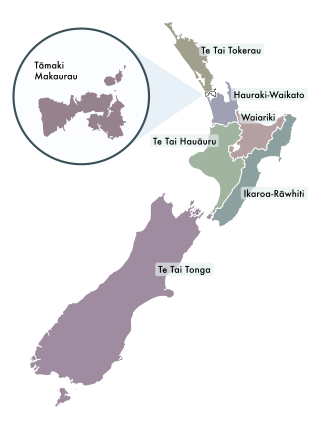
In New Zealand politics, Māori electorates, colloquially known as the Māori seats, are a special category of electorate that give reserved positions to representatives of Māori in the New Zealand Parliament. Every area in New Zealand is covered by both a general and a Māori electorate; as of 2020, there are seven Māori electorates. Since 1967, candidates in Māori electorates have not needed to be Māori themselves, but to register as a voter in the Māori electorates people need to declare that they are of Māori descent.
Te Ringa Mangu Netana "Dun" Mihaka was a New Zealand Māori activist, author, and political candidate.

The 2005 New Zealand general election on Saturday 17 September 2005 determined the membership of the 48th New Zealand Parliament. One hundred and twenty-one MPs were elected to the New Zealand House of Representatives: 69 from single-member electorates, including one overhang seat, and 52 from party lists.

The 47th New Zealand Parliament was a term of the Parliament of New Zealand. Its composition was determined by the 2002 election, and it sat until 11 August 2005.

Sir Pita Russell Sharples is a New Zealand Māori academic and politician, who was a co-leader of the Māori Party from 2004 to 2013, and a minister outside Cabinet in the National Party-led government from 2008 to 2014. He was the member of Parliament for the Tāmaki Makaurau electorate in Auckland from 2005 to 2014. He stepped down as co-leader role of the Māori Party in July 2013.

Māori politics is the politics of the Māori people, who were the original inhabitants of New Zealand and who are now the country's largest minority.

Hone Pani Tamati Waka Nene Harawira is a New Zealand Māori activist and former parliamentarian. He was elected to parliament as the member for the Māori electorate of Te Tai Tokerau in 2005 as the Māori Party candidate.

Te Tai Hauāuru is a New Zealand parliamentary Māori electorate, returning one Member of Parliament to the New Zealand House of Representatives, that was first formed for the 1996 election. The electorate was represented by Tariana Turia from 2002 to 2014, first for the Labour Party and then for the Māori Party. Turia retired and was succeeded in 2014 by Labour's Adrian Rurawhe who retained the seat in 2017 and again in 2020.
Rahui Reid Katene is a New Zealand politician. She was elected to the 49th New Zealand Parliament at the 2008 general election representing the Māori Party in the seat of Te Tai Tonga, but lost in the 2011 general election to Labour's Rino Tirikatene.
The Marine and Coastal Area Act 2011 is an Act of the New Zealand Parliament created to replace the Foreshore and Seabed Act 2004. It was brought in by the fifth National government and creates a sui generis property class for the marine and coastal area, in which it is vested in no one. This is in contrast to the Foreshore and Seabed Act 2004 in which the foreshore and seabed were vested in the Crown.
Whānau Ora is a major contemporary indigenous health initiative in New Zealand, driven by Māori cultural values. Its core goal is to empower communities and extended families to support families within the community context rather than individuals within an institutional context.

Titewhai Te Hoia Hinewhare Harawira was a New Zealand Māori activist. Born in Whakapara and descended from Ngāpuhi chiefs, Harawira was an outspoken political commentator and a civil rights campaigner beginning with her involvement with activist group Ngā Tamatoa in the 1970s. She became a nationally recognised figure due in part to her role escorting New Zealand prime ministers onto the marae during annual Waitangi Day celebrations.
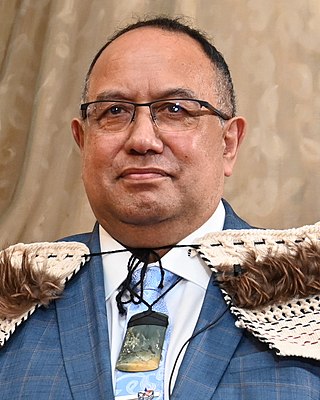
Adrian Paki Rurawhe is a New Zealand Labour Party politician. He has been an MP since 2014, and the speaker of the New Zealand House of Representatives from 2022 to 2023.

Harete Makere Hipango is a New Zealand politician. She was a member of parliament in the House of Representatives for the National Party and sat on the Māori Affairs Committee.

Dame Rangimārie Naida Glavish is a New Zealand politician and Māori community leader from the Ngāti Whātua iwi. From 2013 to 2016, she was President of the Māori Party.

Debbie Anne Ngarewa-Packer is a New Zealand politician, iwi leader and activist. She is a Member of Parliament and co-leader of Te Pāti Māori alongside Rawiri Waititi, and is the chief executive of the Ngāti Ruanui iwi.
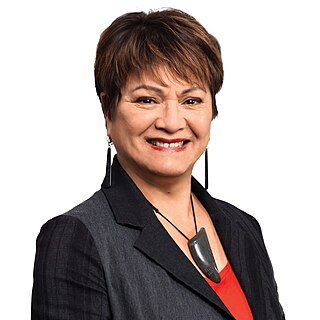
Soraya Waiata Peke-Mason is a New Zealand politician. She was a Member of Parliament in the House of Representatives for the Labour Party from 2022 to 2023.
